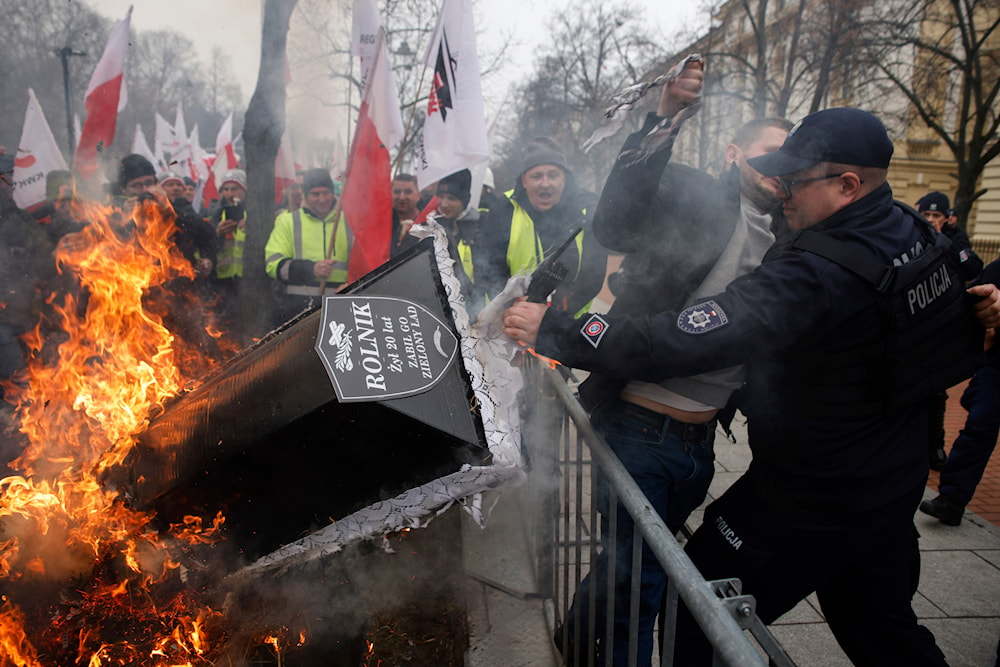EU witnessing 'alarming' decline in the rule of law: Report
In its annual report, Liberties network demonstrates that in older democracies, such as France and Germany, opposition to the rule of law remained sporadic.
-

A police officer stops a protester by a burning coffin during a protest in Warsaw, Poland, on Wednesday, March 6, 2024. (AP)
The rule of law in the European Union is declining as its governments persist in weakening legal and democratic aspects, specifically in restrictions on the right to protest, The Guardian reported, citing the Berlin-based Liberties network.
In its annual report, gathered with 37 rights groups in 19 countries, the network demonstrates that in older democracies, such as France, Germany, and Belgium, opposition to the rule of law remained sporadic, but in long-established democracies where far-right parties influence power, like Italy and Sweden, the decline of the rule of law was becoming systemic.
In recently re-established democracies like Slovakia, Slovenia, and Poland, the rule of law “can swing rapidly - either towards recovery or decline."
The executive director of the Civil Liberties Union for Europe (Liberties), Balázs Dénes, stated that its 600-page report, which is often used by the European Commission in its rule-of-law monitoring, demonstrated the need for the EU to act faster.
“The bottom line is that the commission, the entire EU, are sitting on a very powerful toolbox but they are reluctant to use it quickly and assertively,” Dénes said, adding, “We are alarmed by the lack of serious analysis of what is actually going on in some places.”
He added that imposing infringement proceedings or conditional freezing of EU funds could and should be done, but Brussels was “like a bystander. They fail to realize some governments are deliberately destroying checks and balances.”
Read next: Farmers clash with police near Brussels European Quarter
He cited Hungary as an example where now-systemic rule-of-law issues remain unresolved to show “just how badly things can turn... to the extent it is now serving as an inspiration to the likes of Fico."
The Liberties report stated that last year’s pension changes in France were “enacted in a manifestly undemocratic legislative process” following the use of special constitutional powers, while journalists in Germany faced criminal trials if they published judicial decisions that were not publicly accessible.
Meanwhile, in Italy and Sweden, Liberties’ partners reported the relapse of the rule of law in the justice system, media freedom and pluralism, civic space, and human rights.
'Limited Space'
Robert Fico, Slovakia's Prime Minister, was “systematically dismantling democratic structures," while neighboring Slovenia's pro-democracy government was imposing measures to reverse sustained efforts by its populist predecessor to bring back democratic norms.
Liberties added that Poland underlined “the challenge of restoring rule of law without breaking the very legal foundations one seeks to revive” as liberal democracy was being restored after eight years of populism.
Poland’s Prime Minister, Donald Tusk, vowed to bring back EU norms to unblock tens of billions in funding held back by Belgium due to democratic backsliding for the past eight years of rule by the nationalist Law & Justice party.
Dénes explained that an indication of a government’s direction was its approach to the public, in particular its treatment of civil rights and other NGOs. “Even countries like France and Germany are limiting this space,” he said.
“Fico said days after his election he would be coming for NGOs, and in Sweden, the [far-right] Sweden Democrats began attacking them too, as soon as the government they’re supporting was formed. It’s a strong indicator of respect for the rule of law,” he added.
Other civic space restrictions included limitations on peaceful protest, which increased significantly in several countries last year.
Belgium, Bulgaria, the Czech Republic, Estonia, Germany, Hungary, and Sweden all introduced protest bans and restrictions on freedom of speech, especially during the start of the war on Gaza, Liberties said, adding that climate protesters were also singled out with arrests for non-violent protests on the rise.
The report warned that the concentration of media ownership and verbal and physical attacks on journalists were a worry in many EU states, and the disregard for the rights of refugees and migrants was “a dire issue” among EU member states, as the rights of unaccompanied minors were backtracking.
Justice systems were called “politicized, underfunded, and unfair” in the report, noting that countries like Sweden took measures to depoliticize judicial selection processes, but politicization remained a risk in countries like France, Germany, Greece, Hungary, and Slovakia.
Read more: EU Parliament votes for media freedom, limiting spying on reporters
It additionally asserted that in Germany, Belgium, the Czech Republic, and Slovakia, accountability mechanisms could allow “the exercise of political pressure by the executive branch over judges," warning that would be the case if extremist parties rose to power.
In Greece, Italy, and Slovakia, politicians openly criticized court decisions or gave instructions in ongoing cases, while governments’ refusal to comply with rulings in asylum and border protection cases reached record highs in Greece and Belgium.

 5 Min Read
5 Min Read








